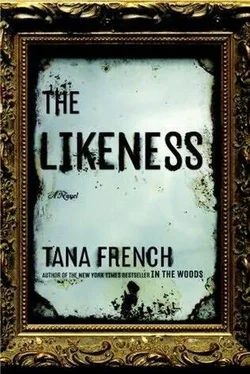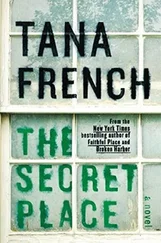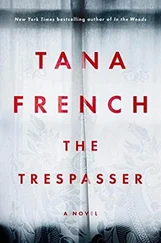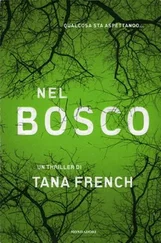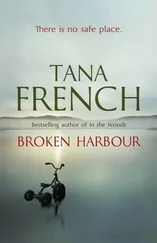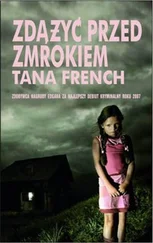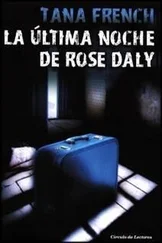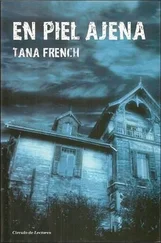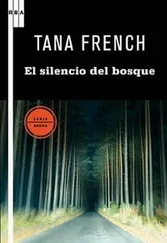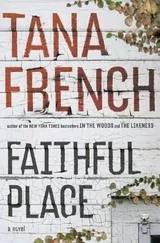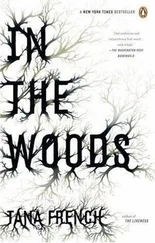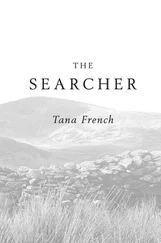“And if we don’t? If we never do anything brilliant, or if they say no anyway. Then what?”
That wing brush again, along the line of my jaw. To go consenting.
“Then,” I said, “I’ll survive. And you’ll have to put up with me bitching about Maher for the rest of our lives.” I stretched out my hand to Sam and I saw the look that was dawning in his eyes, and as he reached over to put the ring on my finger I realized there was no jagged black terror falling through me this time, no wild scream at the irrevocable thing inches away and rising, I wasn’t frightened at all; the only thing I felt was sure.
***
Later, when we were cocooned in the duvet and the sky outside was turning salmon-colored, Sam said, “There’s one more thing I need to ask you, and I’m not sure how to do it.”
“Ask away,” I said. “Comes with the territory.” I waved my left hand at him. The ring looked good on there. It even fit.
“No,” Sam said. “Something serious.”
I figured at this point I was ready for anything. I turned over on my stomach and propped myself up so I could look at him properly.
“Rob,” he said. “You and Rob. I saw the way you were together, the two of ye; how close you were. I always expected… I never thought I had a look in.”
This one I had not been ready for.
“I don’t know what went wrong between ye,” Sam said, “and I’m not asking. I’ve no right to know. Just… I’ve some idea what you went through, during Operation Vestal. And after. I wasn’t trying to be nosy, nothing like that; but I was there.”
He looked up at me, steady gray eyes, unblinking. There was nothing I could say; my breath was gone.
It was that night with the headlights, the night I went to get Rob at the crime scene. I knew him well enough to know that otherwise he would disintegrate, just smash into a million pieces, but not well enough to guess that he would do it anyway, and that all I had done was draw the flak my way. We did something good; I thought that meant no damage could come of it. It’s occurred to me since that I may be a lot dumber than I look. If I learned one thing in Murder, it’s that innocence isn’t enough.
I’m not Lexie, I’m not clockwork, specially not when I’m wrecked and stressed and wretched. By the time the terrible sinking feeling kicked in, I had moved to DV, Rob had been bounced into bureaucratic limbo somewhere and all our bridges were burned to bitter ash; he had gone so far away I couldn’t even see him on the other side. I didn’t tell anyone. I got the boat to England before dawn one sleety Saturday and was back in my dark flat that night-the plane would have been faster but I couldn’t take it, the thought of sitting still for an hour each way, squashed elbow to elbow between strangers. I walked up and down the deck of the boat instead. On the way back the sleet came down harder, soaked me to the bone; if there had been anyone else on deck they would have thought I was crying, but I wasn’t, not even once.
Sam was the only person I could stand to be around, then. Everyone else was on the other side of a thick, wavy glass wall, they yammered and gestured and pulled faces and it took all the energy I had to work out what they wanted from me and make the right noises back. Sam was the only one I could hear. He has a beautiful voice: a country voice, slow and calm, deep and rich as earth. That voice was the one thing that made it through the glass and felt real.
When we met for coffee that Monday after work, he gave me a long intent look and then said, “You look like you’ve the flu; it’s going around. I’ll bring you home, will I?” He tucked me into bed, went to the shops to buy food, came back and cooked me stew. Every night that week he made me dinner and told terrible jokes till I laughed just at the hopeful look on his face. Six weeks later, I was the one who kissed him first. When those square gentle hands touched my skin I could feel ripped cells healing. I never fell for Sam’s big-thick-bogger act, I was always sure there was more; but it had never once occurred to me-I told you I’m dumber than I look-that he had known, every step of the way, and known to leave it.
“The only bit I need to know,” Sam said, “is whether it’s over, for you; the whole thing. Whether… I can’t be wondering, our whole lives, what would happen if Rob got his head together and came back wanting to… I know how hard it was for you. I tried to-give you space, I suppose they call it; to figure things out. But now, if we’re really engaged… I just need to know.”
The first sunlight was exploding onto his face, turning him grave and clear-eyed as some tired apostle in a window. “It’s over,” I said. “It really is, Sam. It’s all over now.”
I laid a hand on his cheek; it was so bright that for a second I thought it was burning me, a pure painless fire. “Good,” he said, on a sigh, and his hand came up to cup the back of my head and pull me down on his chest. “That’s good,” and his eyes were closing before he finished the sentence.
***
I slept till two in the afternoon. Sometime in there Sam dragged himself out of bed and kissed me good-bye and closed the door softly behind him, but nobody rang to tell me to get my arse into work, presumably because nobody had managed to disentangle what squad I was on right then or whether I was suspended or whether I still had a job at all. When I finally woke up I considered calling in sick, but I wasn’t sure who to call-Frank, probably, but he was unlikely to be in a conversational mood. I decided to let someone else figure this one out. Instead I headed up to Sandymount village, kept my eyes off the newspaper headlines, bought food, went home and ate most of it, and then took a very long walk on the beach.
It was a sunny, lazy afternoon. The promenade was full of old people wandering along with their faces turned up to the sun, couples leaning into each other, overexcited toddlers tumbling along like big sweet bumblebees. I recognized a lot of people. Sandymount’s still holding onto being that kind of place, where you know faces and swap smiles and buy homemade perfume from the neighbors’ kids; it’s one of the reasons I live there, but that evening it felt strange and disconcerting all the same. I felt like I had been away too long for that, long enough that the shop fronts should all have been different, the houses painted new colors, the familiar faces grown up, grown old, gone.
The tide was out. I took off my shoes, rolled up my jeans and walked out onto the sand till the water was ankle-deep. One moment from the day before fell through my head, over and over: Rafe’s voice, soft and dangerous as snow, saying to Justin, You bastard fuck.
This is what I could have done, in that last second before it all exploded: I could have said, “Justin? You stabbed me?” He would have answered. It would have been there on the tape, and sooner or later Frank or Sam would have found a way to make him say it again, under caution this time.
Probably I’ll never know why I didn’t do it. Mercy, maybe; one drop of it, too little and too late. Or-this is the one Frank would have picked-too much emotional involvement, even then: Whitethorn House and the five of them still dusted over me like pollen, still turning me glittering and defiant, us against the world. Or maybe, and I like to hope it was this one, because the truth is more intricate and less attainable than I used to understand, a bright illusive place reached by twisting back roads as often as by straight avenues, and this was the closest I could come.
When I got home Frank was sitting on my front steps with one leg stretched out, teasing the next-door cat with an untied shoelace and whistling “Leave Her, Johnny, Leave Her” through his front teeth. He looked terrible, crumpled and bleary-eyed and in serious need of a shave. When he saw me he folded his leg back under him and stood up, sending the cat whisking off into the bushes.
Читать дальше
